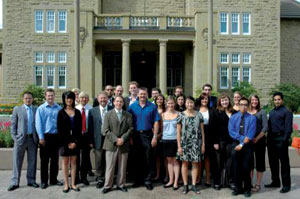Volunteer your debt away
by Miriam Ostermann

Photo Courtesy of Meghan Melnyk. Doug Horner, Minister of Advanced Education, was unable to meet with the student groups in mid- October, but is no stranger to meeting with the groups, as he did in mid-August with representatives from ASEC, CAUS and AGC.
A make-or-break meeting between the Ministry of Advanced Education and the Alberta Students’ Executive Council (ASEC) resulted in a great deal of support and excitement towards a proposal that could result in lower student debt. The meeting, held on Oct. 22 in Edmonton, was imperative for the “Volunteer to be debt free” initiative — a program that offers to reduce student debt based on volunteer hours.
ASEC, which represents 12 post-secondary institutions in- cluding Mount Royal University, met with a number of higher- level members of the Ministry of Advanced Education and Tech- nology, and looked at the nuts and bolts of the program to de- cide whether such an initiative would be feasible. In the ideal case, the initiative would cut student loan debt in half. Previously, ASEC proposed that students be allowed to have their debt reduced by $500 for every 100 volunteer hours and by $2,000 for every 300 hours. However, these numbers are not set in stone and are among the details that still have to be finalized. The students who can take advantage of this program have to work off their debt through not-for-profit organizations.
However, questions still remain about what constitutes volunteer hours and how to count them. “If we didn’t come in prepared and we weren’t ready, then basically they would’ve said, ‘We’re going to kibosh this,’ but they didn’t,” said Meghan Melnyk, VP external for the Students’ Association of Mount Royal University (SAMRU). “So we jumped through another hurdle. There’s lots to go through, it would probably be next September at the earliest that we might see it emerge.”
While many details still need to be examined,a number of students at the meeting had a great deal of support for the idea. Steven Kwasny, chair of ASEC, said he is also optimistic about the benefits the initiative would bring, but admitted there are still many challenges and details to deal with. “With the economy the way it is, and the budgets the way they are right now, it’s, ‘how do we tell it to (them) in a way to sort of sell the idea to politicians,’ so that they don’t look at it as a reason to cut something somewhere else,” Kwasny said. “It’s a very new idea, and it’s something that doesn’t happen anywhere else.
“The ministry has been really keen on this idea because it’s not something they have heard a thousand times before and this is something I think is most exciting for them because it’s a new idea that could potentially solve a lot of problems.” Kwansy said the biggest challenges are finding financial support, getting other ministries onboard and receiving government commitment.
While working off student- loan debt, the program also fosters a closer relationship between students and their communities while gathering work experience and career- related skills. “This is something they’ve been doing for years, decades even, with youth and collection services,” Melnyk said. “Even Calgary Transit, if you get on the train and you don’t have your ticket then you have a choice between doing volunteer hours or paying a fine. This is something we have in the city, so it’s not like we don’t have a precedent for it and so the theory is good.”





When volunteering is used in this way one hour of volunteering reduces a students debt by five dollars.
.. I wonder if some volunteer work such as building a playground compared to other volunteer work managing a budget on the school board compared to serving in CUSO is all the same. So what about people that don’t have a student debt to pay off? Would they also be eligible for this volunteer reward and if they were receiving social assistance would it be declared and how would it be treated? Would it be treated different than earned income? Federally would it be taxable and count towards a pension like CPP ?